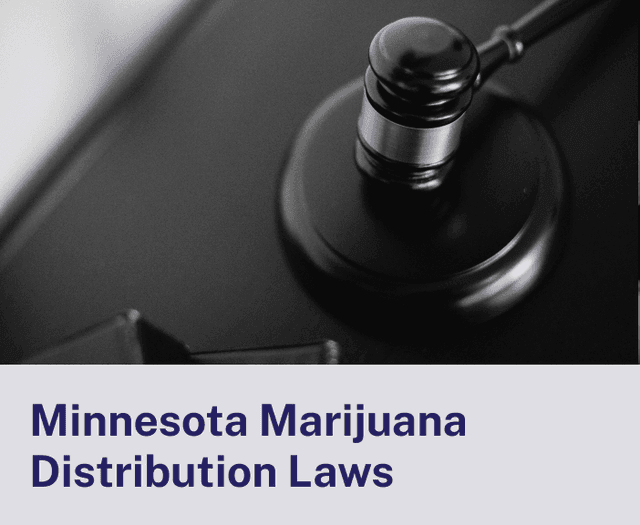Minnesota Marijuana Distribution Laws
- Minnesota Cannabis
- Minnesota Marijuana Laws
- Limitations
- Distribution Laws
What Is Possession With Intent To Distribute Marijuana in Minnesota?
Persons could be charged for marijuana possession if they are caught carrying or transporting cannabis products unlawfully, and they could face serious punishments if convicted. The penalties for marijuana possession under Minnesota law depend on the amount of cannabis recovered from offenders. Anyone convicted of carrying more than 2 oz. but less than 4 oz. of marijuana products is guilty of petty misdemeanors punishable by $300 maximum fines. They may also be required to participate in drug education programs.
When there is proof suggesting that an offender planned to transfer cannabis products to others, their possession charge could be elevated to possession with intent to distribute. Having large quantities of cannabis products could be used as evidence of possession with intent to distribute. However, a prosecutor can point to other facts, such as the possession of baggies used for packaging cannabis for sale. Also, having weighing scales, guns, large amounts of cash, and chemicals commonly used to extract or manufacture cannabis products illegally may be considered evidence suggesting an intent to distribute. The severity of punishment an offender gets when convicted of marijuana possession with intent to distribute in Minnesota depends on whether or not they received remuneration for giving cannabis products to others. In addition, Minnesota law classifies the penalties for cannabis possession with intent to distribute based on the amounts of cannabis products recovered from offenders.
Can You Enter a Dispensary at 18 in Minnesota?
Yes. As stipulated in Section 152.22 of the Minnesota Statutes, persons 18 years or older may be registered as medical marijuana caregivers in the state. A medical marijuana caregiver in Minnesota can legally enter dispensaries, purchase cannabis supplies, and assist registered patients with the medical use of marijuana products. The Minnesota medical cannabis program, contained between Sections 152.22 and 152.37 of the Minnesota Statutes, allows minors to use medical marijuana. However, they cannot enter dispensaries to obtain their prescriptions. Medical marijuana patients must be up to 18 years old before entering dispensaries.
Minnesota would not allow residents to enter recreational marijuana dispensaries when they turn 18. The law that legalized adult-use cannabis in the state limits recreational cannabis use and possession to adults aged 21 or older.
Can You Enter a Dispensary Without a Card in Minnesota?
The Minnesota Department of Health states that medical marijuana patients registered under the state's medical cannabis program must carry government-issued photo identifications when obtaining their prescriptions from dispensaries. Dispensary employees use such identifications to confirm patients' enrollment in the Minnesota medical marijuana program before dispensing cannabis products to them.
When recreational cannabis dispensaries are licensed and established in the state, eligible adults will not require medical marijuana cards to enter or buy cannabis from these outlets. However, they may need to provide valid government-issued photo IDs to confirm that they are 21 years or older to enter these dispensaries.
What Are the Penalties for Possession With Intent To Distribute First Offense in Minnesota?
The penalty for marijuana possession with intent to distribute in Minnesota is mild if an offender is caught with a ''small amount'' of marijuana and there is no payment for marijuana products delivered. An offender is guilty of a petty misdemeanor if they illegally sell up to 2 oz. of marijuana. This offense is punishable by a $300 maximum fine.
Illegally distributing over 2 oz. of cannabis is an offense referred to as Cannabis Sale in the Third Degree in Minnesota. It is punishable by up to 90 days in jail and $1,000 in fines. Importing 100 kg or more of cannabis into Minnesota is a felony punishable by up to 35 years in prison and $1.25 million in fines.
Selling cannabis to a minor is also a felony. Its punishments include a maximum prison sentence of 20 years and $250,000 in fines. Selling in a school zone, park, public housing, and other specified areas is a felony punishable with up to 15 years in prison and a maximum fine of $100,000. Selling between 5 and 25 kg of cannabis in a school zone is a felony punishable with up to 25 years in prison and $500,000 in fines.
Is It Legal To Sell Weed in Minnesota?
Yes. Both medical and recreational marijuana are legal in Minnesota. However, only licensed dispensaries may legally sell them. Eligible patients and caregivers can visit medical cannabis dispensaries in the state to buy marijuana for approved medical uses. When the state’s first licensed recreational cannabis dispensaries become operational, adults can also buy weed from these outlets as long as they are 21 years or older.
How To Sell to Dispensaries in Minnesota
Minnesota only allows registered manufacturers to sell medical cannabis products to dispensaries. Currently, the state only licenses two such manufacturers of medical cannabis. As Minnesota designs and implements the framework for its recreational marijuana market, it will license manufacturers for adult-use cannabis products too.
How To Get a Distribution License in Minnesota
Cannabis distribution licenses usually allow holders to grow and process cannabis plants and supply them to dispensaries. Minnesota does not currently issue cannabis distribution licenses.
Speak With a Cannabis Attorney
Request AssistanceAre You Arrested on Cannabis Charges?
Call the 24/7 Support Line